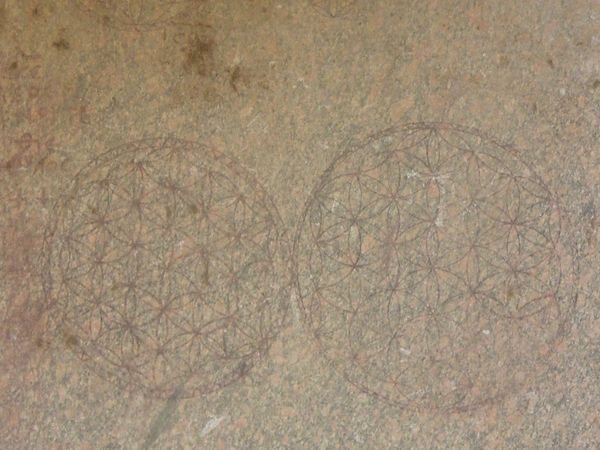Ellen Lloyd - AncientPages.com - The Flower of Life is a modern name given to an ancient sacred geometry symbol used by many different civilizations.
The symbol is of great spiritual and religious importance and believed to depict the fundamental forms of space and time. It has long been regarded as a blueprint of the Universe, containing the basis for the design of every atom, molecular structure, life form, and everything in existence. So, it is, without doubt, one of the most powerful ancient symbols.
The Flower of Life Can Be Found World-Wide
Just like the Ouroboros, an ancient infinity symbol, the Flower of Life can be found almost everywhere. The oldest known example of the Flower of Life has been discovered at the Temple of Osiris at Abydos, Egypt. However, as one of the most ancient symbols known to mankind, we also find the Flower Of Life at the Golden Temple in Amritsar, a Buddhist temple at Ajanta, India, in ancient Chinese temples, in the Louvre, in Spain, Japan, Lebanon, at the city of Ephesus and many other places.
In the Forbidden City, in Beijing, China the Flower of Life can be seen underneath the paw of the “Fu-Dog”, the “Guardian Lion”.
This palace was home to 24 emperors of the Ming and Qing dynasties. Like the Sphinx, the Fu-Dogs were a symbol of protection to the buildings and their inhabitants, and also, they were considered to be the guardians of knowledge.
What Is The Meaning Of The Flower Of Life?
At first glance, the Flower of Life appears to be rather simple, but there is a deeper meaning behind its design. The symbol is made up of multiple overlapping circles of the same size, 13 circles to be precise. Many people think that understanding the Flower of Life can help us to understand how the Universe works. Sacred geometry ascribes symbolic and sacred meanings to certain geometric shapes and certain geometric proportions.
A fascinating and inspirational look at the vital link between the hidden geometrical order of the universe, geometry in nature, and the geometry of the man-made world.
Stephen Skinner, author of his book, the Sacred Geometry writes as follows: "The Da Vinci Code has awakened the public to the powerful and very ancient idea that religious truths and mathematical principles are intimately intertwined. Sacred Geometry offers an accessible way of understanding how that connection is revealed in nature and the arts. Over the centuries, temple builders have relied on magic numbers to shape sacred spaces, astronomers have used geometry to calculate holy seasons, and philosophers have observed the harmony of the universe in the numerical properties of music. By showing how the discoveries of mathematics are manifested over and over again in biology and physics, and how they have inspired the greatest works of art, this illuminating study reveals the universal principles that link us to the infinite..". Read more
Many ancient people believed that numbers had a symbolic meaning aside from their everyday use. Various shapes such as triangles, octagons, and hexagons are believed to be physical manifestations of a number. Sacred geometry has often inspired the designs of sacred architecture and sacred art.
One scientist who became very interested in the Flower of Life was Leonardo DaVinci, He studied it so he could to learn more about its mathematical properties and in what way it was connected to physical reality as well as consciousness. Leonardo was known for using the Golden Ratio of Phi in his artwork, this is also known as the Fibonacci Spiral, which is derived from the Flower of Life pattern.
The Flower of Life - used today for study and meditation - is considered as a very ancient source of knowledge. Circles explain different aspects of reality and the symbol contributes with information ranging from the human body to the distant galaxies.
Written by - Ellen Lloyd - AncientPages.com
Copyright © AncientPages.com & Ellen Lloyd All rights reserved. This material may not be published, broadcast, rewritten or redistributed in whole or part without the express written permission of AncientPages.com and Ellen Lloyd







